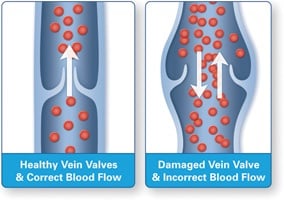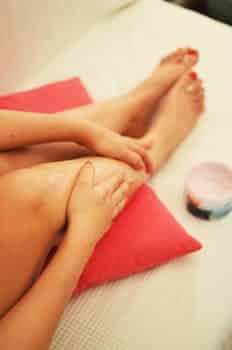Can Venous Insufficiency be Reversed?

Can Chronic Venous Insufficiency (CVI) be reversed?
Unfortunately the short answer to this question is no; but CVI can be treated with minimally invasive procedures which can reduce symptoms and improve quality of life tremendously!
Chronic Vein Insufficiency Causes
In order to understand why venous insufficiency or peripheral venous insufficiency cannot be reversed, we must look at what causes venous disease. The most prevalent cause of venous insufficiency is genetics. A family history of vein disease is the biggest predictor of whether or not most people will develop vein problems. If a parent, grandparent, aunt, or uncle has or had problems with veins, it is likely that the reason you have developed them is purely genetic. Currently in medical research, there is no way to prevent this trait from being passed down the family tree.
Another venous insufficiency cause is hormones. Particularly in women, any shift in hormones; normal menstrual cycle, hormonal birth control, hormone replacement, menopause, and a combination of factors in pregnancy; cause the valves and walls of superficial veins to become weak. It is the weakness of these vein structures that cause the symptoms associated with venous insufficiency including: leg fatigue, leg heaviness, leg swelling, nighttime leg cramps, leg pain, restlessness of your legs, vein itching, itchy legs, prominent varicose veins, and spider veins.
Trauma is another cause of venous insufficiency. Although only a few cases of venous insufficiency can be linked to trauma alone, it is quite possible that a traumatic injury to the leg can cause enough damage that would affect the venous system.
Research has suggested that other health conditions may contribute to the weakening of the venous system including; lower extremity lymphedema, diabetes, obesity, smoking, hypertension, and arterial disease. However, direct correlations among these factors are still being researched, and current studies reveal conflicting results.
Regardless of which of the above venous insufficiency causes directly contribute to your specific venous condition, once the superficial veins are insufficient (weak); similar to a stretched out rubber band, there is not a way for these veins to regain their elasticity. It is the loss of elasticity or compliance that causes symptoms. These peripheral venous insufficiency symptoms become worse as time progresses and can be aggravated by things such as standing in one place (working as a hairstylist, teacher, cashier) and sitting for long periods of time (driving, desk jobs, flying in a plane). At night leg restlessness and leg cramping can wake people from sleep or make it difficult to fall asleep. Summertime heat can aggravate symptoms as it causes veins to become dilated and weaker.
Chronic Venous Insufficiency Treatment
Although there is no cure for venous insufficiency or venous disease, symptoms can be helped with compression stockings, exercise, cooler weather, leg elevation, and some homeopathic regimens. When these conservative methods no longer help, straight forward, minimally invasive procedures exist to alleviate the discomfort associated with venous insufficiency. These modern techniques cause little pain and fast recovery for the sufferer.
If you are experiencing leg fatigue, heaviness, swelling, night cramps, pain, restlessness, itching, prominent varicose or spider veins, have your legs evaluated by our qualified Vein Specialist to discuss appropriate treatment options for your specific case.
Q & A Pregunta: ¿Qué es el tiempo de induración? Respuesta: el downtime se basa en gran medida en el tipo de intervención y la severidad de la enfermedad venosa. Independientemente del tipo de intervención, nuestros pacientes reanudan todas las actividades el mismo día que el tratamiento. Algunos tratamientos requieren medias de compresión post-procedimiento, pero…
Read MoreQ & A Question: What is the down time? Answer: Downtime is largely based on the type of intervention and severity of the vein disease. Regardless of the type of intervention, our patients resume all activities the same day as treatment. Some treatments require compression stockings post-procedure, but most times these are worn for comfort and…
Read MoreVenas dolorosas y antiestéticas de las piernas Con el calor de Arizona, un día de verano, día de invierno, o cualquier día es ideal para usar shorts. Pero para aquellos con varices o venas de araña, la idea de usar pantalones cortos es preocupante y lleva a la ansiedad severa. Según el Departamento de salud…
Read MorePainful and unsightly leg veins With the Arizona heat, a summer day, winter day, or any day is ideal for wearing shorts. But for those with varicose veins or spider veins, the thought of wearing shorts is troubling and leads to severe anxiety. According to the U.S. Department of Health and Human Services, 55% of…
Read MorePregunta: ¿dos ultrasonidos Doppler encuentran cualquier coágulo de pierna? (Muslo o pantorrilla). ¿Es el síndrome de mayo-Thurner (MTS) posible y un venography necesario en mi caso?
Read MoreQuestion: Would two Doppler ultrasounds find any leg clots? (Thigh or calf). Is May-Thurner syndrome (MTS) possible and a venography necessary in my case?
Read MoreSi quisiera deshacerse de las venas antiestéticas, las venas de araña, o las varices dolorosas; a continuación, la búsqueda de resultados de escleroterapia, a través de un especialista en la vena, puede ser la elección correcta para ayudar a mejorar su dolor, la felicidad y su apariencia. En este procedimiento rutinario, el médico de la…
Read MoreIf would like to get rid of unsightly veins, spider veins, or painful varicose veins; then pursuing sclerotherapy results, through a vein specialist, may be the right choice to help improve your pain, happiness, and your look. In this routine procedure, your vein doctor injects a chemical into the veins which will cause the veins…
Read MoreParece concebible que cuando los expertos en Salud estiman que el 10 por ciento de las mujeres embarazadas experimentan várices vulvares, es decir, varices vaginales, podrían subestimar groseramente la incidencia de esta afección. Hay mujeres — que saben cuántas — que no reportarán este dolor, picazón, pesadez e incomodidad general en la vulva, ya sea…
Read MoreIt seems conceivable that when health experts estimate that 10 percent of pregnant women experience vulvar varicosities, that is to say vaginal varicose veins, they could be grossly underestimating the incidence of this condition. There are women—who knows how many—who will not report this pain, itch, heaviness and general discomfort in the vulva, either because…
Read More


